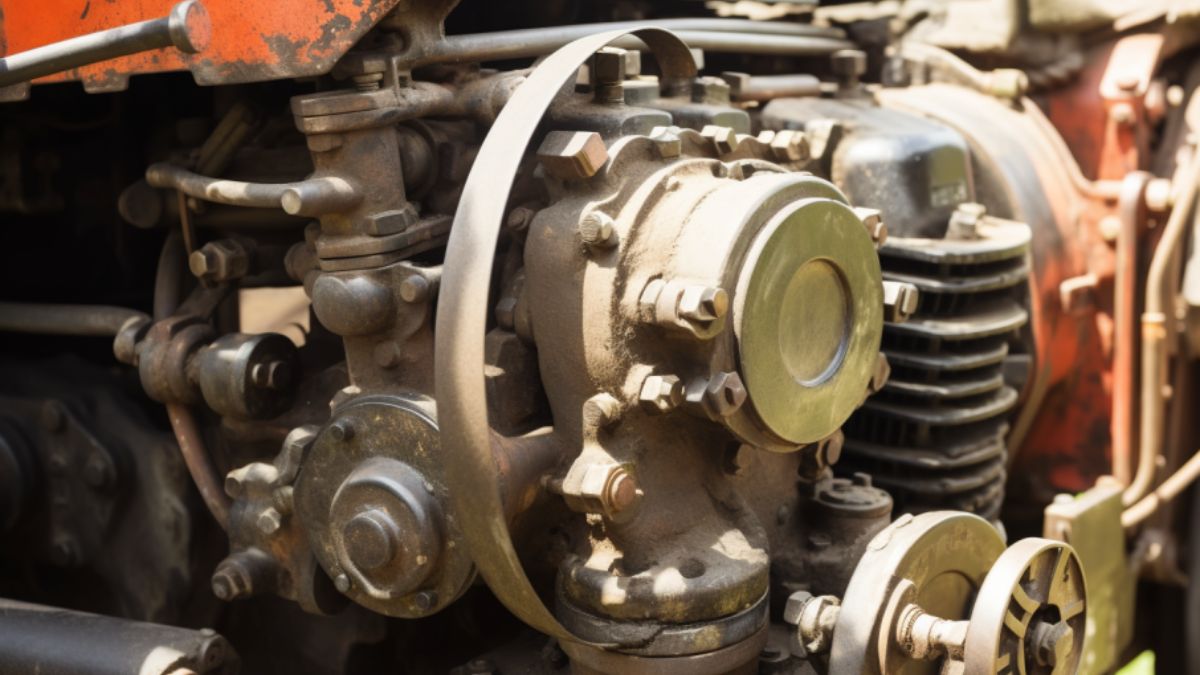Tractor Engines: Gas vs. Diesel – Which is Best for You?

Tractors are essential machines that are widely used in agriculture, construction, and other industries. One of the most critical components of a tractor is its engine. When it comes to tractor engines, there are two primary types: gas and diesel. Both have their advantages and disadvantages, and choosing the best one for your needs can be a daunting task. In this article, we will explore the key differences between gas and diesel tractor engines to help you make an informed decision.
Gas engines are known for their simplicity and lower upfront costs. They typically have fewer parts than diesel engines, making them easier to maintain and repair. On the other hand, diesel engines are known for their durability and fuel efficiency. They tend to have a longer lifespan and can handle heavy workloads without overheating. Additionally, diesel engines can run on different types of fuels, including biodiesel, which can be a more environmentally friendly option. Understanding the strengths and weaknesses of each type of engine is crucial in determining which one will be the best fit for your tractor needs.
Introduction: Gas vs. Diesel Tractor Engines
Tractors are vital machines used in agriculture, construction, and other heavy-duty industries. They require powerful and reliable engines to handle various tasks, ranging from tilling fields to moving large loads. Gas and diesel engines are the two primary engine types used in tractors. While both have their advantages and disadvantages, choosing the right engine for your tractor is crucial in ensuring efficient and effective operation.
Gas engines are known for their simplicity, lower upfront costs, and ease of maintenance and repair. They typically have fewer parts than diesel engines, making them easier to diagnose and fix when something goes wrong. Gas engines are also ideal for smaller tractors or light-duty applications due to their lower horsepower ratings. Diesel engines, on the other hand, are the industry standard for larger tractors due to their high torque output and fuel efficiency.
However, they come with a higher initial cost and require more maintenance, making them better suited for heavy-duty applications. In this article, we will delve deeper into the differences between gas and diesel engines, helping you make an informed decision when choosing an engine for your tractor needs.
Understanding the Basics: How Gas and Diesel Engines Work
Understanding how gas and diesel engines work is crucial in choosing the right engine for your tractor. Both types of engines work by converting chemical energy from fuel into mechanical energy that drives the tractor’s wheels. However, the way they do it is different.
Gas
Gasoline or petrol is the primary fuel used in gas engines. The fuel is mixed with air in the carburetor before being injected into the engine cylinder. The air-fuel mixture is ignited by the spark plug, creating an explosion that drives the piston down and rotates the crankshaft. Gas engines are designed to operate at higher RPMs than diesel engines, making them ideal for applications that require high speeds and quick acceleration.
Diesel
Diesel engines work by compressing air in the engine cylinder, which raises the temperature and pressure. Diesel fuel is then injected into the cylinder, where it ignites spontaneously due to the high temperature and pressure. The explosion drives the piston down and rotates the crankshaft, producing power and torque. Diesel engines have a higher compression ratio than gas engines, which means they produce more power and torque. They are also more fuel-efficient than gas engines, making them ideal for heavy-duty applications that require constant power output.
Performance Comparison: Power and Torque
Performance is a crucial factor when it comes to choosing a tractor engine. Two key performance indicators are power and torque. Power is the rate at which work is done, while torque is the rotational force produced by the engine. Both gas and diesel engines have different power and torque outputs, which can significantly impact the tractor’s performance.
Gas engines typically have lower power and torque output than diesel engines due to their lower compression ratio. They are better suited for light-duty applications that require quick acceleration and high RPMs. Gas engines have a smoother operation and are more responsive than diesel engines. They are also easier to start in cold weather conditions, making them ideal for use in colder climates.
Diesel engines, on the other hand, have a higher compression ratio, which means they produce more power and torque. They are designed for heavy-duty applications that require constant power output, such as plowing or hauling heavy loads. Diesel engines have a slower RPM range, making them less responsive than gas engines. However, they make up for it with their high torque output, which allows them to handle heavy loads without overheating. Diesel engines are also more fuel-efficient than gas engines, making them more cost-effective in the long run.
Fuel Efficiency: Cost and Environmental Impact
Fuel efficiency is another crucial factor to consider when choosing a tractor engine. Fuel costs can make up a significant portion of the operating costs of a tractor, and choosing a more fuel-efficient engine can result in significant savings over the long term. Additionally, fuel efficiency can impact the environmental impact of the tractor.
Gas engines are generally less fuel-efficient than diesel engines due to their lower compression ratio. They consume more fuel per hour of operation, which can result in higher operating costs in the long run. However, gas engines have a lower initial cost and are easier to maintain and repair than diesel engines.
Diesel engines, on the other hand, are more fuel-efficient than gas engines due to their higher compression ratio. They consume less fuel per hour of operation, making them more cost-effective in the long run. Additionally, diesel engines can run on different types of fuel, including biodiesel, which can be a more environmentally friendly option. However, diesel engines have a higher initial cost than gas engines and require more maintenance and repairs.
In terms of environmental impact, diesel engines produce less carbon dioxide (CO2) emissions than gas engines due to their higher fuel efficiency. However, they emit more nitrogen oxides (NOx) and particulate matter (PM) than gas engines, which can negatively impact air quality.
Maintenance and Repair: Upfront Costs and Long-Term Durability
Maintenance and repair are critical factors to consider when choosing a tractor engine. Tractors are heavy-duty machines that require regular maintenance and occasional repairs to ensure optimal performance and longevity. Upfront costs and long-term durability are also essential considerations when it comes to maintenance and repair.
Gas engines are typically easier and less expensive to maintain and repair than diesel engines. They have fewer parts, which means there are fewer things that can go wrong. Gas engines also have simpler fuel and ignition systems, making them easier to diagnose and fix. However, gas engines have a shorter lifespan than diesel engines and may require more frequent maintenance and repairs over time.
Diesel engines are generally more durable and longer-lasting than gas engines. They have a higher compression ratio and run at lower RPMs, which means they experience less wear and tear. However, diesel engines have more complex fuel and ignition systems, which can make them more challenging to maintain and repair. Additionally, diesel engines have higher upfront costs than gas engines and may require specialized equipment and trained technicians for maintenance and repairs.
In terms of long-term durability, diesel engines are typically a better investment due to their longer lifespan and lower operating costs. However, upfront costs and the need for specialized maintenance and repair may make gas engines a more attractive option for some tractor operators.
Choosing the Right Engine for Your Needs: Considerations and Recommendations
Choosing the right engine for your tractor requires careful consideration of your needs, priorities, and resources. Here are some key considerations and recommendations to help you make an informed decision:
- Application: Consider the intended use of your tractor. If you need a tractor for light-duty applications that require quick acceleration and high RPMs, a gas engine may be the best choice. However, if you need a tractor for heavy-duty applications that require constant power output, a diesel engine is likely the better option due to its high torque and fuel efficiency.
- Operating costs: Consider the operating costs of each engine type. Gas engines have lower upfront costs, but they are generally less fuel-efficient than diesel engines, resulting in higher operating costs over the long term. Diesel engines have higher upfront costs, but they are more fuel-efficient, resulting in lower operating costs over the long term.
- Maintenance and repair: Consider the maintenance and repair requirements of each engine type. Gas engines are generally easier and less expensive to maintain and repair than diesel engines. Diesel engines are more durable and longer-lasting than gas engines but may require specialized maintenance and repair.
- Environmental impact: Consider the environmental impact of each engine type. Diesel engines produce less CO2 emissions than gas engines but emit more NOx and PM, which can negatively impact air quality. Gas engines produce more CO2 emissions than diesel engines but emit less NOx and PM.
In general, if you need a tractor for heavy-duty applications, a diesel engine may be the better choice due to its high torque and fuel efficiency. However, if you need a tractor for light-duty applications or have limited resources, a gas engine may be the better option due to its lower upfront costs and ease of maintenance and repair. Ultimately, the choice between gas and diesel engines depends on your individual needs and priorities.
Making an Informed Decision for Your Tractor Engine
Choosing the right engine for your tractor is a crucial decision that requires careful consideration of your needs, priorities, and resources. To make an informed decision for your tractor engine, consider the following factors:
- Application: Consider the intended use of your tractor and the type of work you will be doing. This will help you determine the power and torque requirements of your engine.
- Fuel efficiency: Consider the fuel efficiency of each engine type and how it will impact your operating costs over the long term.
- Maintenance and repair: Consider the maintenance and repair requirements of each engine type and how they will impact your ongoing costs.
- Environmental impact: Consider the environmental impact of each engine type and how it aligns with your sustainability goals.
- Upfront costs: Consider the upfront costs of each engine type and how they fit into your budget.
By carefully evaluating these factors, you can make an informed decision about which engine type is best for your needs. Remember that the choice between gas and diesel engines ultimately depends on your individual priorities and resources. Take the time to research and compare your options to ensure that you choose the engine that is right for you and your tractor.

